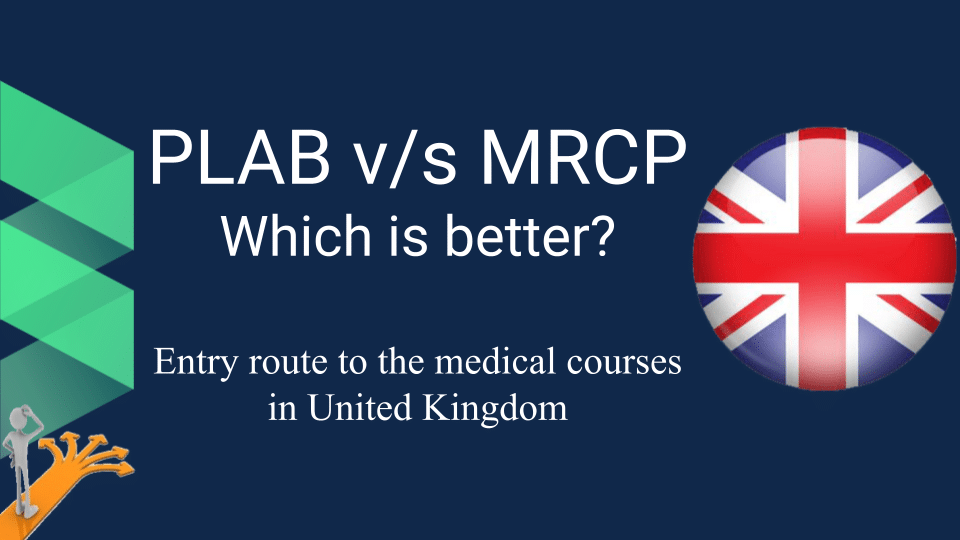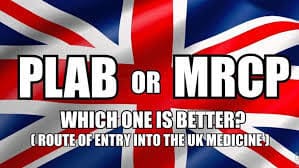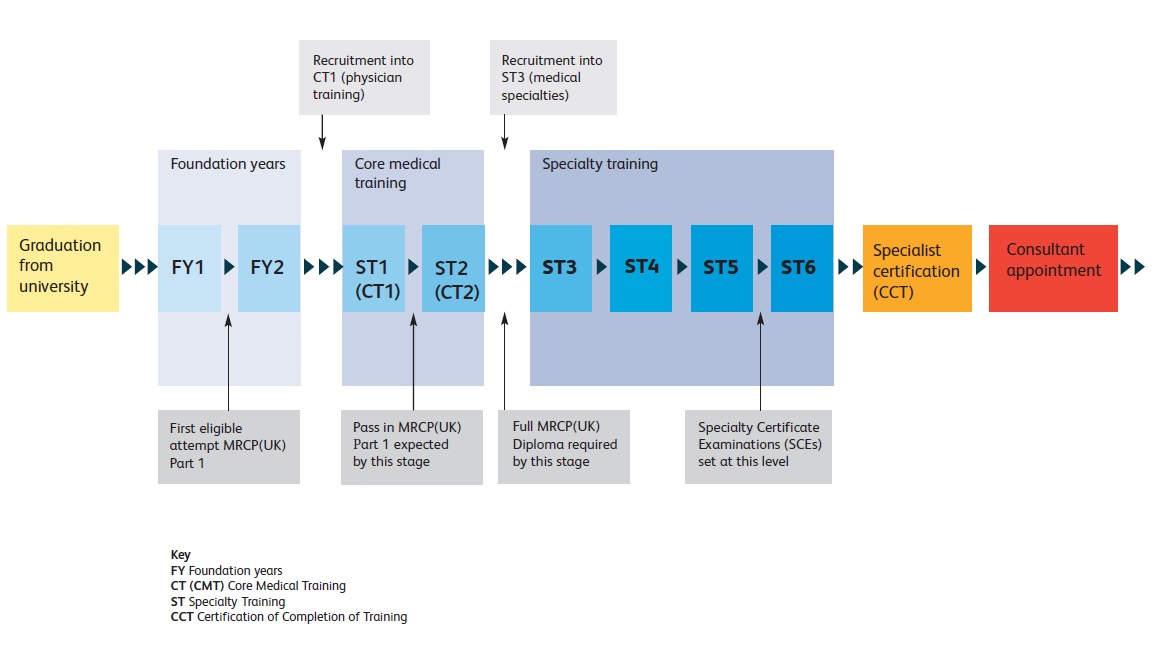
PLAB vs MRCP – Which is Better? This is a common confusion among international medical graduates (IMGs) who intent to work and train in the UK. Both PLAB and MRCP serve different purposes and cater to different career paths, making it crucial for doctors to understand which one aligns with their goals. While PLAB is a licensing exam that allows IMGs to work as junior doctors in the NHS, MRCP is a postgraduate qualification that leads to specialization in internal medicine. Many medical graduates struggle with PLAB vs MRCP difficulty level, exam format, and career prospects, making it hard to decide the right route. The PLAB vs MRCP salary comparison, training opportunities, and long-term scope further add to the confusion. If you’re wondering PLAB or MRCP – which is better -, this article will break down the key differences, eligibility criteria, and benefits of each pathway, helping you make an informed decision based on your career aspirations. The Professional and Linguistic Assessments Board (PLAB) exam is a two-part assessment conducted by the General Medical Council (GMC), UK. It’s designed for international medical graduates (IMGs) who want to practice medicine in the UK. PLAB primarily tests clinical knowledge and communication skills expected of a UK Foundation Year 2 doctor. Unlike MRCP, PLAB doesn’t grant specialist registration but serves as a stepping stone to secure FY2 or non-training roles.
When considering a medical career in the UK, international doctors often debate between the Professional and Linguistic Assessments Board (PLAB) test and the Membership of the Royal Colleges of Physicians (MRCP) exam.
Quick Comparison Table – PLAB vs MRCP
| Feature | PLAB | MRCP |
|---|---|---|
| Purpose | Entry to practice as a junior doctor in the UK | Postgraduate qualification for internal medicine |
| Eligibility | MBBS or equivalent | MBBS + at least 1 year experience |
| Exam Parts | PLAB 1 & PLAB 2 (OSCE) | Part 1, Part 2 (written), PACES (clinical) |
| Exam Difficulty | Moderate | Advanced/Postgraduate level |
| Time to Completion | 6–12 months | 2–3 years |
| Cost (Approx.) | £1,200–£1,500 total | £2,500–£3,000 total |
| Outcome | GMC Registration (non-specialist) | Progression to specialist training (e.g., CCT) |
| Visa Pathway | Tier 2 or PSW | Tier 2 or MTI |
Here’s a more detailed comparison to help you make an informed decision.

PLAB or MRCP: What Is PLAB?
The Professional and Linguistic Assessments Board (PLAB) test is the primary route for international medical graduates (IMGs) to work as junior doctors in the UK.
It’s designed to test knowledge, clinical skills, and communication — but not specialist knowledge.
Key Highlights:
-
PLAB 1: MCQ-based, theory exam
-
PLAB 2: Practical OSCE-style exam
-
Does not lead to specialist recognition
-
Ideal for fresh MBBS graduates or those with 1–2 years of clinical practice
The PLAB (Professional and Linguistic Assessments Board) exam is a test run by the General Medical Council (GMC) UK to check if international medical graduates (IMGs) have the right knowledge and clinical skills to work safely as doctors in the UK healthcare system.
This exam is a must for doctors who earned their medical degree outside the UK, EEA (European Economic Area), or Switzerland and want to register with the GMC to start working in NHS hospitals. It ensures that IMGs meet the same medical standards as UK-trained doctors before they can practice in the country.
The PLAB exam is divided into two parts: PLAB 1 is a written test with 180 multiple-choice questions, and PLAB 2 is a practical assessment known as an Objective Structured Clinical Examination (OSCE).
Structure of PLAB Exams
The PLAB exam consists of two parts: PLAB 1 and PLAB 2.
PLAB 1: Multiple Choice Exam (MCQs)
-
Format: 180 multiple-choice questions (MCQs)
-
Duration: 3 hours
-
Type of Questions: Single best answer (SBA) format
-
Content: Covers common clinical conditions seen by doctors working in UK hospitals, particularly in NHS settings.
-
Topics Covered:
-
Clinical management and diagnosis
-
Patient safety and communication
-
Ethics and professional practice
-
Common diseases and their treatments
-
Emergency and acute care
-
Exam Locations: Conducted in multiple countries, including India, Pakistan, UAE, Bangladesh, Nigeria, Egypt, and the UK. Exam Frequency: Held multiple times a year.
How to book PLAB 1? Guidance Notes
PLAB 2: Objective Structured Clinical Examination (OSCE)
-
Format: A practical exam with 16 clinical stations
-
Duration: Each station lasts 8 minutes
-
Type of Assessment: OSCE-based (Objective Structured Clinical Examination)
-
Content:
-
Patient consultations (history-taking, diagnosis, management)
-
Clinical examinations (e.g., cardiovascular, respiratory, neurological exams)
-
Communication skills (breaking bad news, dealing with anxious patients)
-
Ethical and professional conduct scenarios
-
Exam Location: Only conducted in the UK at the GMC Clinical Assessment Centre in Manchester. Exam Frequency: Held throughout the year.
How to book PLAB 2? Guidance Notes
Tips for Success in PLAB Exam
How to Apply UK PLAB 2 Visa? Documents and Funds Requirement
How to Pass the PLAB Exam?
To pass PLAB, candidates should:
- Use GMC PLAB blueprint as a study guide.
- Prepare with PLAB 1 question banks like PLABABLE and PassMedicine.
- Improve communication and consultation skills following NHS standards.
- Take PLAB 2 mock exams to boost confidence before the final test.
PLAB or MRCP : What is MRCP (Membership of the Royal College of Physicians)?
MRCP (UK) stands for Membership of the Royal Colleges of Physicians – a postgraduate qualification required to pursue Internal Medicine or Specialties like Cardiology, Gastroenterology, etc.
Why choose MRCP?
-
Recognised globally as a specialist credential
-
Divided into three parts:
-
MRCP Part 1 (MCQs)
-
MRCP Part 2 (written clinical scenarios)
-
MRCP PACES (practical exam)
-
Note: Requires extensive clinical experience, ideally 2+ years post-MBBS.
The Membership of the Royal Colleges of Physicians (MRCP) exam is a prestigious postgraduate medical qualification designed for doctors who wish to specialize in internal medicine and advance their careers in higher specialty training (HST) in the UK and internationally. The Membership of the Royal College of Physicians (MRCP) is a postgraduate medical diploma essential for those pursuing specialist training in internal medicine in the UK. It comprises three stages—Part 1, Part 2 Written, and PACES (clinical skills). MRCP is significantly more challenging and time-intensive than PLAB but offers a direct route into higher specialty training and eventually, consultant-level roles.
Unlike PLAB, MRCP is not a licensing exam; instead, it is a postgraduate qualification that demonstrates expertise in internal medicine and is a stepping stone towards becoming a consultant physician. It is recognized in the UK, Middle East, India, and other Commonwealth countries.
Structure of the MRCP Exam
The MRCP exam consists of three parts:
MRCP Part 1
-
Format: Two papers with 100 multiple-choice questions (MCQs) each
-
Duration: 3 hours per paper
-
Question Type: Best of five (BoF) format
-
Exam Focus: Covers basic medical sciences and common clinical conditions
-
Topics Covered:
-
Cardiology, Respiratory, Gastroenterology
-
Endocrinology, Neurology, Rheumatology
-
Infectious diseases, Psychiatry, Oncology
-
Hematology, Pharmacology, Genetics, Immunology
-
Exam Locations: Conducted worldwide in multiple countries. Exam Frequency: Three times a year
MRCP Part 2
-
Format: Two papers with 100 MCQs each
-
Duration: 3 hours per paper
-
Question Type: Best of five (BoF) format
-
Exam Focus: Covers advanced clinical knowledge, diagnosis, and patient management
-
Topics Covered:
-
Clinical scenarios requiring problem-solving
-
Interpretation of lab results and imaging
-
Case management and ethical considerations
-
Exam Locations: Available worldwide. Exam Frequency: Three times a year
MRCP PACES (Practical Assessment of Clinical Examination Skills)
-
Format: OSCE-style exam with five stations
-
Duration: 2.5 hours
-
Stations Covered:
-
Respiratory & Abdominal Examination
-
Cardiovascular & Neurological Examination
-
History Taking
-
Communication Skills & Ethics
-
Integrated Clinical Assessment
-
Exam Locations: Conducted in UK and selected international centers. Exam Frequency: Multiple sittings per year
PLAB or MRCP: Aim of Examinations
Aim of PLAB Examination
The PLAB (Professional and Linguistic Assessments Board) exam is designed to assess whether international medical graduates (IMGs) have the necessary clinical knowledge and communication skills to work safely as a doctor in the UK healthcare system. The primary aim of PLAB is to ensure that doctors trained outside the UK, EEA, or Switzerland meet the same standards as UK-trained graduates before they can register with the General Medical Council (GMC UK) and start working in the NHS.
The PLAB exam is NOT a postgraduate qualification; instead, it is a licensing test that allows IMGs to practice at the Foundation Year 2 (FY2) level in NHS hospitals. It is ideal for those who want to enter the UK medical workforce quickly and efficiently.
Key aims of PLAB:
✅ Assess basic clinical competencies and ability to work as a junior doctor in the UK
✅ Ensure patient safety and ethical medical practice following NHS standards
✅ Evaluate clinical judgment, decision-making, and communication skills in a healthcare setting
✅ Provide a pathway for IMGs to secure GMC registration and apply for jobs in NHS hospitals
Aim of MRCP Examination
The Membership of the Royal Colleges of Physicians (MRCP) exam is a postgraduate medical qualification aimed at doctors who wish to specialize in internal medicine and advance to higher specialty training (HST) in the UK or internationally.
Unlike PLAB, MRCP is NOT a licensing exam; it is a professional qualification that validates a doctor’s expertise in internal medicine and demonstrates readiness for advanced clinical training. It is required for those who aim to become consultant physicians in the UK and is recognized in several countries outside the UK, including the Middle East, India, and Commonwealth nations.
Key aims of MRCP:
✅ Assess in-depth medical knowledge and diagnostic skills in internal medicine
✅ Prepare doctors for higher specialty training (HST) and consultant roles
✅ Test clinical decision-making, problem-solving, and case management abilities
✅ Provide international recognition for physicians seeking advanced training opportunities
PLAB vs MRCP – Which One Should You Choose?
This depends on your goals, timeline, and current stage:
| Scenario | Recommended Path |
|---|---|
| Fresh MBBS graduate with no specialty decision | ✅ PLAB |
| Want to enter NHS quickly and gain experience | ✅ PLAB |
| Already practicing in Internal Medicine | ✅ MRCP |
| Aiming for GMC specialist register in future | ✅ MRCP |
| Looking for global career in medicine | ✅ MRCP |
Pro Tip: You Can Take Both
Some IMGs take PLAB first, work in the NHS, then pursue MRCP while earning a salary.
This hybrid route:
-
Saves money
-
Offers hands-on NHS exposure
-
Keeps multiple doors open for training or career progression
PLAB vs MRCP – UK Medical Training Explained

Foundation Years (F1 & F2)
The Foundation Programme is a structured two-year training programme designed for doctors who have recently completed medical school. This programme provides practical experience across different medical specialties and serves as the first step in postgraduate medical training in the UK healthcare system.
During this period, doctors work under the supervision of senior healthcare professionals to develop their clinical skills and knowledge while caring for patients.
-
In Foundation Year 1 (F1), doctors are provisionally registered with the GMC and must demonstrate competency in various medical skills as outlined in the Outcomes for Provisionally Registered Doctors. Upon successful completion, they become eligible to apply for full GMC registration.
-
In Foundation Year 2 (F2), doctors receive full GMC registration but continue to work under supervision. They begin to take on greater responsibility for patient care and develop the necessary competencies to proceed to core medical training (CMT) or specialty training.
Upon completing the Foundation Programme, doctors choose their preferred career path, either entering specialty training (including general practice) or pursuing higher medical education.
Core Medical Training (CMT)
Core Medical Training (CMT) is a structured postgraduate training programme designed for doctors pursuing a career in internal medicine. Overseen by the Joint Royal Colleges of Physicians Postgraduate Training Board (JRCPTB), it is the initial step towards obtaining higher specialty training (HST) in medical specialties.
-
Recruitment: Entry into CMT is highly competitive, with over 2,700 applicants competing for just over 1,500 posts annually. Selection is based on an online application, followed by regional interviews conducted by Local Education and Training Boards.
-
Structure: The programme consists of 4- or 6-month rotations across different medical specialties, ensuring broad clinical exposure. Trainees gain hands-on experience in acute medical admissions, developing critical decision-making skills.
-
Assessments: Throughout CMT, doctors undergo an Annual Review of Competence Progression (ARCP) to assess their progress.
-
MRCP Requirement: Completion of the Membership of the Royal College of Physicians (MRCP) exam is essential to progress into specialty training. Without MRCP, a doctor cannot enter higher specialty training in medicine.
Under the Modernising Medical Careers (MMC) system, CMT doctors are referred to as specialty registrars, although this term is commonly reserved for those who have passed MRCP and started subspecialty training.
Specialty Training in the UK
In the UK medical system, doctors who complete specialty training become eligible for consultant positions or general practice (GP) roles. Specialty training programmes vary in duration and are tailored to individual specialties.
-
Entry into Specialty Training: Doctors apply for specialty training schemes after completing foundation training, often through a competitive selection process.
-
Curriculum and Assessments: Each specialty follows a curriculum set by the relevant Royal College, ensuring doctors meet high professional standards.
-
Completion of Training: To qualify as a specialist, doctors must successfully complete their training and pass the Certificate of Completion of Training (CCT) assessment.
-
General Practice Training: Training to become a GP follows a structured pathway, and upon completion, doctors are eligible for entry onto the GP Register.
Previously, applicants had to complete Royal College membership exams before applying for specialist registrar posts. However, under the current training system, foundation doctors do not need to sit these exams before applying for specialty training. Nevertheless, many doctors begin taking these exams during F2, which is recommended by medical training experts.
Certificate of Completion of Training (CCT)
A Certificate of Completion of Training (CCT) confirms that a doctor has successfully completed a GMC-approved training programme and is eligible for entry onto either the GP Register or the Specialist Register. This is a legal requirement for:
-
Doctors working as consultants in the NHS.
-
General Practitioners (GPs) practicing in the UK healthcare system.
Since the GMC has approved and quality-assured CCT training programmes, the registration process for CCT-holders is streamlined compared to other specialist or GP registration applications.
For IMGs, choosing PLAB or MRCP affects their pathway to CCT:
-
PLAB graduates must complete Foundation Training and Core Medical Training before entering specialty training leading to CCT.
-
MRCP holders can bypass PLAB and enter directly into higher specialty training, reducing the overall time required to achieve CCT and specialist registration.
By understanding the pathway to CCT, IMGs can make informed decisions about PLAB vs MRCP, ensuring their career progression aligns with their long-term goals in the UK healthcare system.
PLAB vs MRCP: Popular routes for International Medical Graduates

Eligibility Criteria and Requirements
PLAB Route
To take the PLAB exam, you need a primary medical qualification recognized by the General Medical Council (GMC) and verified by ECFMG and proof of English proficiency, such as IELTS or OET.
MRCP Route
For MRCP, candidates must have at least 12 months of postgraduate experience in medical employment and must be registered with a medical regulatory authority.
PLAB or MRCP – MRCP Route – RCP MTI (RCP Medical Training Initiative)
Now, International Medical Graduates must be worried about the GMC Registration so that they can undertake Hands on Training during their medical residency in the UK. The Royal College of Physicians’ MTI scheme offers sponsorship for GMC registration and Tier 5 visa support to enable international medical graduates (IMGs) to access short-term training opportunities in the UK. The scheme aims to facilitate access to core medical or advanced specialty training and service experience for overseas doctors to improve the management and treatment of patients around the world.
Eligibility requirement for RCP MTI – GMC Sponsorship
You must fulfil all of the following criteria:
- You must hold a primary medical qualification recognised by the GMC and verified by ECFMG
- You need to have a postgraduate qualification (MRCP(UK) part 1, MD or other higher degree in medicine or a medical subspecialty.)
- You must have completed at least 3 years of full-time postgraduate training (including 1 year’s internship and at least 1 year in the specialty in which you intend to train while in the UK).
- You must have been in clinical practice for 3 out of the last 5 years including the 12 months prior to GMC registration being granted. There should be no gaps in employment. Please note that the GMC does not consider clinical observerships as clinical practice. It is important that you remain in clinical practice during the application process.
- You must possess the skills, competencies and understanding of medicine at least equivalent to a UK graduate at the end of their CMT.
The RCP cannot sponsor doctors who have failed the Professional and Linguistic Assessments Board (PLAB) test.
English language requirements
You need to have obtained a minimum overall score of 7.5 in the International English Language Testing System (IELTS) examination, with minimum scores of 7.0 in all categories. The scores should be obtained in one sitting. The test is valid for 2 years.
PLAB vs MRCP: Cost and Time Investment
As of 2025, here are the latest updates:
-
PLAB 1 Fee: £255
-
PLAB 2 Fee: £934
-
MRCP Part 1 Fee: £460
-
PACES Fee: ~£1,200
UK Visa Update (2025):
-
Graduate Route Visa (PSW): 2 years of stay after studies
-
Tier 2 Visa: For job-sponsored doctors
-
MTI Scheme: For MRCP holders seeking limited-time clinical training
PLAB is a faster and more affordable route to enter the UK medical workforce. The exams are relatively simpler, and you can start working at an FY2 level in the NHS soon after passing.
MRCP requires a larger time commitment and is more expensive, but it provides higher career growth potential. Successfully completing MRCP exams can lead to specialty training, consultant roles, and increased earning potential.
For IMGs aiming for immediate UK employment, PLAB is the ideal choice. However, for those who wish to specialize and progress in internal medicine, MRCP is the better long-term option.
If you need guidance on choosing the right pathway for your medical career in the UK, contact Career Voyage – MD MS Abroad today!
Career Opportunities After PLAB vs MRCP
| Path | Career Scope |
|---|---|
| PLAB | Foundation-level jobs (FY2 equivalents), Trust Grade, or Locum posts |
| MRCP | Core medical training (CMT), Higher Specialty Training (HST), possible entry into ST3 |
| Long-term | MRCP can lead to Consultant-level roles and entry to UK Specialist Register |
PLAB leads to non-training service jobs (e.g., Senior House Officer roles) that can eventually transition into training with effort. However, MRCP holders are often preferred for specialty registrar (StR) or consultant training posts. MRCP also opens doors to jobs in countries like Ireland, Singapore, and the Gulf region where it’s recognized as a postgraduate qualification.
Difficulty Level and Preparation Time
The PLAB exam is generally considered easier and quicker to prepare for—many IMGs can complete it within 6 to 12 months. MRCP demands more rigorous and long-term preparation, often taking candidates 2–3 years to complete all parts while working full-time. This difference makes PLAB more suitable for fresh graduates and MRCP ideal for those with clinical experience.
PLAB or MRCP – Which is better: Verdict
Still confused? Let’s simplify: PLAB or MRCP – Which is better?
-
If your goal is quick entry into NHS as a junior doctor → PLAB is your best bet.
-
If you are career-focused on internal medicine or specialisation → MRCP is the right choice.
-
You can start with PLAB, work, gain NHS experience, then go for MRCP later — it’s common and smart!
Both PLAB and MRCP offer distinct advantages, and the best option depends on your career goals. If you are a fresh medical graduate with no clinical experience, the PLAB route is the quickest way to enter the UK healthcare system. It does not require postgraduate experience, making it the best choice for those who want to start working in NHS hospitals quickly.
On the other hand, MRCP is better suited for doctors who already have at least one year of postgraduate experience and hold a postgraduate qualification. It is ideal for those aiming for specialty training, higher salary prospects, and international recognition in internal medicine and consultant-level roles.
Choosing between PLAB and MRCP depends on your goals, budget, and timeline. If you want to enter the UK medical system quickly and affordably, PLAB is the better route. But if you’re aiming for long-term specialist training and higher positions, MRCP is worth the extra effort. Still confused? Let our expert advisors at Career Voyage guide your decision based on your background and aspirations.
Clinical MD in UK without PLAB
Entry Requirements
International Applicants to the Doctor of Medicine in Internal Medicine should have:
- An MBBS or equivalent degree from an internationally recognised medical school.
- Two years post MBBS experience including one year of internship at a hospital and must supply their Certificate of Completion.
- Should not be any unexplained gap in their post MBBS career.
- Should not have appeared and failed to pass the PLAB examination.
- An IELTS score of 6.5, with a minimum of 5.5 in each section.
- Completed their undergraduate training and be fully registered with the Medical Council in their respective countries.
About the Institution
- Government University
- One of the oldest Higher Education Institutions in the UK
- World ranking better than AIIMS, Delhi
- Training association with NHS Hospital
- Excellent Infrastructure and technologically well equipped
Training Pathway
The traditional route is the route, we all are very well aware of. It requires you to clear PLAB to join any PG program or speciality training in UK. In other words we can say that after clearing PLAB 1 and PLAB 2, you are entitled for GMC Registration. After GMC registration and required experience, you are required to take MRCP 1 to join Core Medical Training (CT 1 & CT 2). After two years of training one is required to clear MRCP 2 and MRCP Paces. It awards MRCP Diploma enabling you to take job in UK as a GP.
Clinical MD in internal Medicine is a new programme developed by the University in conjunction with NHS Foundation Trust, primarily aimed at the International Medical Graduates. In order to successfully complete this Clinical MD program, candidates are expected to have GMC registration supported by the Royal College of Physicians’ (RCP) Medical Training Initiative programme. Hands on clinical training will be provided by senior clinicians and medical educators.
Click here to read more about Curriculum and Program details
As discussed earlier (MTI) we have discussed about the sponsorship by Royal College of Physicians (RCP) subject to fulfilment of conditions laid down by the sponsoring body enabling one to take Clinical MD or Speciality Training in UK without clearing PLAB 1 & PLAB 2.
The curriculum is linked to the e-Portfolio as it defines standards required for good medical practice laid out by the General Medical Council and a successful formal assessment at the end of each year placement. In order to obtain the degree candidates need to pass the Exit Exam along with successful completion of all the other modules and the MD dissertation. In conjunction with the Medical Training Initiative Programme by the Royal College of Physician, London, it was agreed that the NHS e-portfolios and the national Core Medical Training curriculum will be used to train and assess the trainees for the Clinical MD programme. Therefore, this curriculum was based in line with the RCP CMT curriculum under the direction of the Joint Royal Colleges of Physicians Training Board (JRCPTB).
In brief, student directly joins CT1 & CT2 training (No need to take PLAB 1 & PLAB 2 ) and during two year training student is encouraged to take MRCP {UK}. Student is eligible to work in the concerned specialty and can also take Specialist Training (ST3 onwards).
More Options for MD & MS in UK without PLAB
FAQ
Can I take both PLAB and MRCP
An MBBS Doctor is eligible to take both exams. PLAB is necessary to gain a license to practice and MRCP is mandatory to enter into speciality training in the UK. It depends upon the career aspiration of the medical professional to choose between PLAB or MRCP
Do I need to pass PLAB to take MRCP?
No PLAB is not required to appear for the MRCP exam. You can appear for the MRCP Exam after one year of post-internship experience.
Which exam has a higher pass rate, PLAB or MRCP?
MRCP is a comparatively easy exam subject to you possess the required knowledge and skill as per the UK standards. PLAB is an exam meant for international fresh graduates so it assesses applicants on international standards and covers all subjects and modules of MBBS whereas MRCP judges knowledge of clinical medicine, evidence-based medicine, assessment and consultation in clinical settings and interpretation of clinical data as per UK standards.
How long is the validity of PLAB or MRCP exam results?
The validity of exam results varies. You should get in touch with relevant authority for this information.
Can I retake PLAB or MRCP if I fail?
Yes, candidates can retake PLAB or MRCP if they fail. Applicants are allowed to take 4 attempts for PLAB and max 6 attempts for MRCP
Can I take MRCP without PLAB?
Yes, MRCP does not require PLAB and is an independent qualification for doctors who wish to specialize in internal medicine.
Which is easier, PLAB or MRCP?
PLAB is generally considered easier as it assesses clinical competency for general practice, whereas MRCP is more advanced and requires in-depth knowledge of internal medicine.
How long does it take to complete PLAB or MRCP?
PLAB can be completed within 6-12 months, whereas MRCP takes longer, typically 2-3 years, as it involves multiple parts and clinical assessments.
Which exam leads to better salary prospects, PLAB or MRCP?
MRCP offers better long-term salary potential as it qualifies doctors for specialty training and consultant roles, whereas PLAB is an entry-level exam to start working as a junior doctor in the NHS.
What is the total cost of PLAB vs MRCP?
PLAB is more affordable, with total exam fees around £1,345, whereas MRCP costs approximately £2,500–£3,000 for all three parts.
Which is better for international recognition, PLAB or MRCP?
MRCP is recognized in multiple countries outside the UK, including the Middle East, India, and other Commonwealth nations, whereas PLAB is primarily for UK medical practice.
Can I switch from PLAB to MRCP later?
Yes, many doctors take the PLAB route to enter the NHS and later pursue MRCP for career progression into specialty training.

